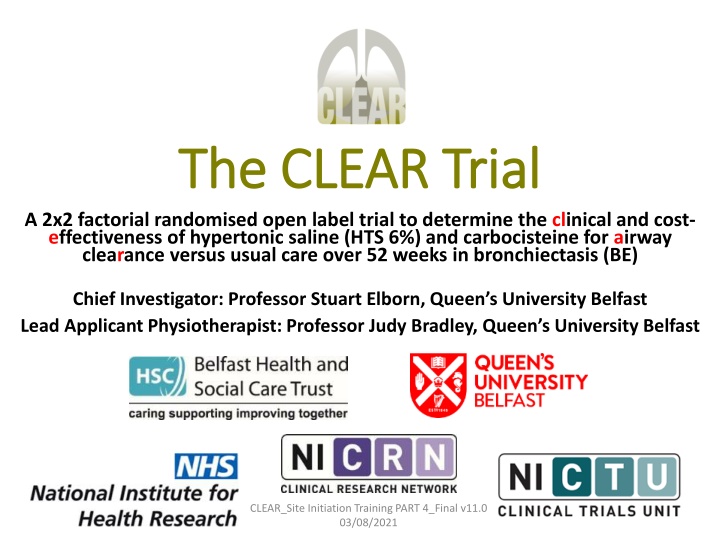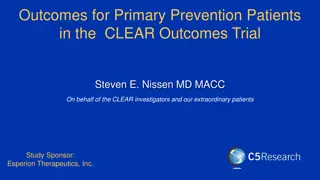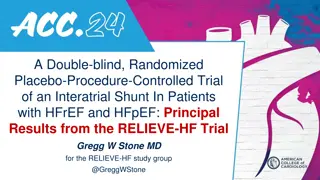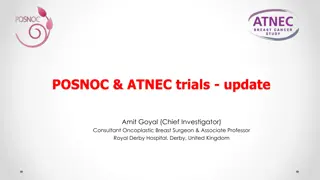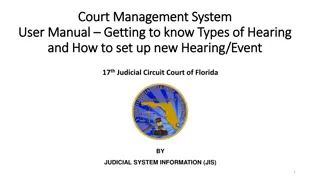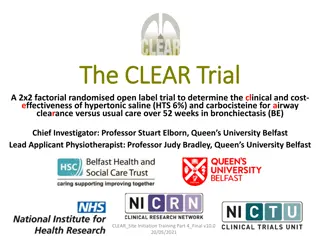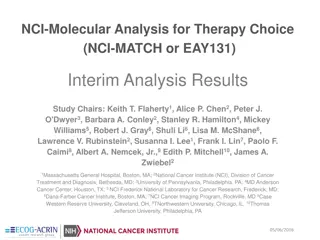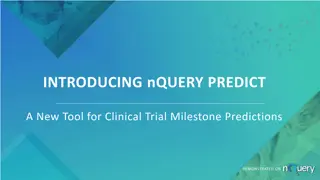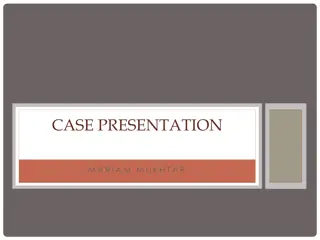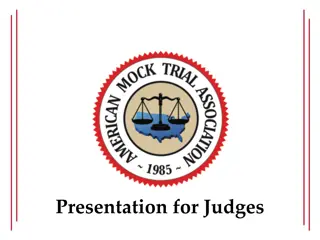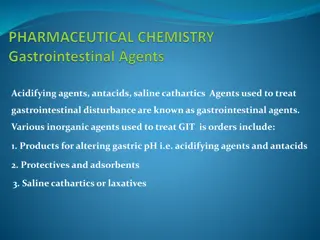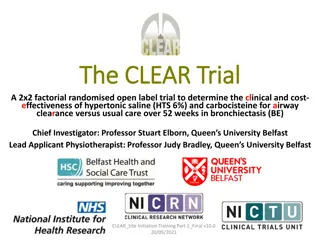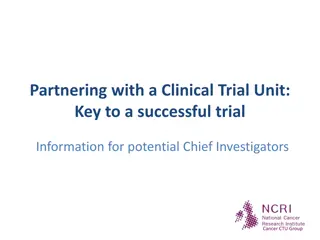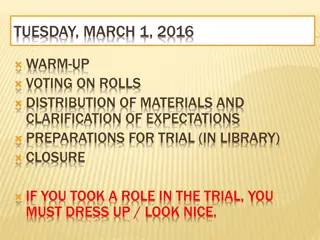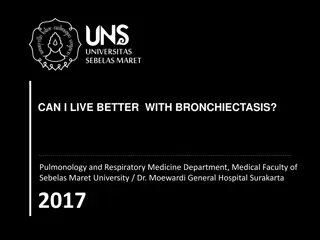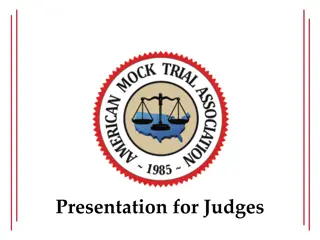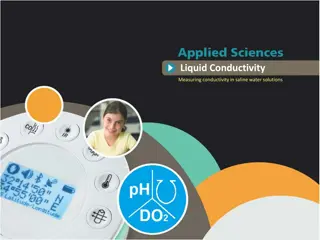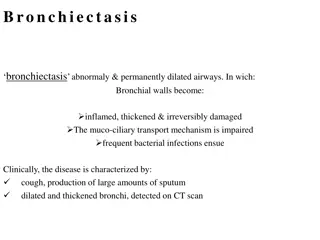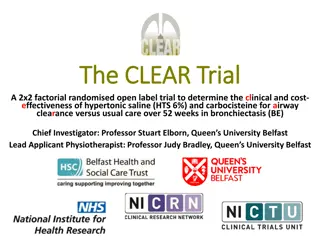The CLEAR Trial: Investigating Hypertonic Saline and Carbocisteine in Bronchiectasis
The CLEAR Trial is a 2x2 factorial randomized trial examining the effectiveness of hypertonic saline and carbocisteine for airway clearance in bronchiectasis over 52 weeks. Led by Professor Stuart Elborn and Professor Judy Bradley from Queen's University Belfast, the study focuses on exacerbation management using the Respiratory and Systemic Symptoms Questionnaire. The trial utilizes three versions of the RSSQ to track pulmonary exacerbations accurately by capturing abrupt changes in patients' symptoms. Proper administration of the RSSQ is crucial for collecting reliable data throughout the study.
Download Presentation

Please find below an Image/Link to download the presentation.
The content on the website is provided AS IS for your information and personal use only. It may not be sold, licensed, or shared on other websites without obtaining consent from the author.If you encounter any issues during the download, it is possible that the publisher has removed the file from their server.
You are allowed to download the files provided on this website for personal or commercial use, subject to the condition that they are used lawfully. All files are the property of their respective owners.
The content on the website is provided AS IS for your information and personal use only. It may not be sold, licensed, or shared on other websites without obtaining consent from the author.
E N D
Presentation Transcript
The CLEAR Trial The CLEAR Trial A 2x2 factorial randomised open label trial to determine the clinical and cost- effectiveness of hypertonic saline (HTS 6%) and carbocisteine for airway clearance versus usual care over 52 weeks in bronchiectasis (BE) Chief Investigator: Professor Stuart Elborn, Queen s University Belfast Lead Applicant Physiotherapist: Professor Judy Bradley, Queen s University Belfast CLEAR_Site Initiation Training PART 4_Final v11.0 03/08/2021
Site Initiation Training Part 4: Exacerbation Site Initiation Training Part 4: Exacerbation Management Management - - Clinical Clinical Respiratory and Systemic Symptoms Questionnaire (RSSQ) Exacerbation management
Respiratory and Systemic Symptoms Respiratory and Systemic Symptoms Questionnaire (RSSQ) Questionnaire (RSSQ) The primary outcome in this study is the number of exacerbations for 52 weeks post randomisation The RSSQ is used to capture exacerbation data, so it is important it is administered correctly The RSSQ collects information regarding 15 signs and symptoms used in definitions of a pulmonary exacerbation The CLEAR trial uses 3 modified versions of the RSSQ: RSSQ since last visit version RSSQ symptoms of exacerbation version RSSQ end of exacerbation version All versions of the RSSQ are administered (i.e. read out to the patient) by the study staff, including on remote visits where they are read out over the phone. Before administering any of the RSSQs, staff should familiarise themselves with the key points in the introduction of the questionnaires
RSSQ RSSQ The RSSQ collects information about abrupt, acute or sudden changes in the patient s symptoms which from the patient s view are noticeably greater than the day-to-day fluctuations that they normally experience Patients are to describe symptoms that have occurred since the last study related visit, and not to compare them with symptoms that they described during the last study visit. Asks patients about symptoms they are likely to experience routinely as part of their normal stable condition. There may also be symptoms which a patient does not normally experience from day-to-day, or have never experienced at all (e.g. coughing up blood). Patients should indicate if they have never experienced a particular symptom. A symptom that the patient has noticed since the last visit, but does not normally experience on a day-to-day basis is seen as a change in that symptom (e.g. if patient does not normally have a cough, but has been coughing since the last visit this would be considered a change in their intensity and/or frequency of cough).
RSSQ RSSQ Which version to administer: Which version to administer: RSSQ VERSION WHEN ADMINISTERED KEY POINTS RSSQ since last visit version At all scheduled study visits unless the scheduled visit coincides with the start/end of exacerbation (see below) Patients are being asked to describe symptoms since the last study visit compared to normal (or over the last 14 days if it is their baseline visit) RSSQ - symptoms of exacerbation version When a patient reports that they are experiencing symptoms of an exacerbation during the study (or if a scheduled visit coincides with the start of of an exacerbation) Patients are being asked to describe symptoms since the last study visit compared to normal,that they have experienced for 48 hours or more RSSQ end of exacerbation version Within 14 days following the end of antibiotic treatment for an exacerbation (or if a scheduled visit coincides with the end of an exacerbation) Patients are being asked to describe symptoms since being prescribed their most recent course of antibiotics for pulmonary exacerbation
RSSQ RSSQ For each question, say the words in quotation marks to the patient verbatim. A less structured interaction then takes place, as the patient provides an initial response and you provide further clarification if necessary. Once the patient has indicated whether the symptom has increased, decreased or not changed, ask the patient to indicate the magnitude of change using the response choices provided Clarification of responses provided should not have any direction implied. The staff will use responses such as more or less or thicker or thinner rather than just more or thicker It is not necessary to provide all the response choices, e.g. if the patient indicates the symptom has increased, then only the responses related to an increase in the symptom need to be provided.
RSSQ Question Example RSSQ Question Example Example: Study staff: The first question deals with changes in your sputum production. Another word for sputum that you may be more familiar with is mucus. Tell me about any changes in the amount of sputum you have been coughing up since the start of your antibiotics Patient: I have noticed that I have been coughing up a lot more sputum in the last couple of weeks than I normally do Study staff: Compared with the amount of sputum you normally cough up; would you say that you have been coughing up much more or a little more? Patient: I would say it has been much more
RSSQ Question Example RSSQ Question Example For some questions the site staff will determine the change experienced by the patient from their response i.e. for Question 2.2 Sputum colour , depending on the colour changes described by the patient the staff will determine if the whether the colour is worse , no change or better .
RSSQ RSSQ Question Example Question Example 5. Increased cough 5.1 Intensity of cough Study Staff: Tell me about any changes in how hard you have been coughing since your last visit. The following response choices will be used: 5.2 Frequency of cough Study Staff: Tell me about any changes in how often you have been coughing since your last visit. The following response choices will be used:
Exacerbation Management Exacerbation Management Our primary outcome is the number of exacerbations for 52 weeks post randomisation This relies on patients contacting study teams when they experience symptoms of an exacerbation. Give all patients a subject card with details of who to call anytime they feel that they are experiencing an exacerbation. Emphasise that symptoms of an exacerbation are more than day-to-day fluctuations and that are usually persistent for 48 hours. Further guidance in the Trial Manual, Section 25: Exacerbation Management Guideline
Exacerbation Management Exacerbation Management Beginning of an exacerbation: When a patient calls the site, research staff will remotely: Complete the First Contact For A Suspected Exacerbation form including: Event number Date of Assessment Did the patient contact at the start of the exacerbation If no, did the patient take any treatment to manage the exacerbation Complete the RSSQ (symptoms of exacerbation version) with the patient. Note the start date and time of symptoms. Ask the patient if they have completed spirometry on that day, and if not instruct them to complete this. Ask patient about any change in medications or other treatment and update the Concomitant Medication form and/or Airway Clearance Log if required. If no antibiotics are prescribed, note the reason why on contact form. The results of the RSSQ will be available immediately. Use the RSSQ to score the exacerbation according to the EMBARC criteria using the table in the patients CRF workbook (See next slide). Flu/COVID-19 symptoms will be managed as exacerbations so please follow steps for management of exacerbation including completion of relevant questionnaires.
Exacerbation Management Exacerbation Management To qualify as an EMBARC-defined exacerbation: - deterioration in at least 3 domains - symptoms present for at least 48 hours - a decision to change bronchiectasis treatment i.e. prescribe antibiotics
Exacerbation Management Exacerbation Management Discuss patient-reported symptoms (and length of symptoms) with PI or other physician at the site who will determine if a prescription for antibiotics or any other change to the patient s treatment is required. If the patient has had symptoms for less than 48 hours, and has not or is not to be started on any antibiotic treatment, arrange a second follow up telephone call for a suspected exacerbation and complete the Second Contact for a Suspected Exacerbation form. This will be recorded as the same event number as the first contact for this specific suspected exacerbation. Complete the RSSQ (symptoms of exacerbation version) with the patient. If an exacerbation is diagnosed, the study team will: Direct the prescription of antibiotics (type, dose, duration of treatment) as instructed by the investigator. This can be rescue antibiotics that the patient has at home. If antibiotics not prescribed, record the reason why. Record this information (and any other changes in bronchiectasis treatment) on the Concomitant Medication form and/or Airway Clearance Log. Schedule a call with the patient to assess the resolution of the exacerbation. The call date will be determined as the end of the antibiotic course that is prescribed to the patient. Remember to put in place plans to replace any used rescue medications so that exacerbations can be managed remotely.
Exacerbation Management Exacerbation Management End of an Exacerbation: The potential end of an exacerbation is defined as the time when the prescribed antibiotic course is completed. At this time point (or up to 14 days later), research staff will complete the End of Exacerbation ContactForm and: Record the event number (this would correspond to the event number at the start of this exacerbation). Record if a telephone call relating to the end of an exacerbation was completed and if not, provide a reason. The research staff will telephone the patient and record the date the patient completed antibiotics and administer the RSSQ Questionnaire (end of exacerbation version) Direct the patient to undertake spirometry. Review the Concomitant Medication form and Airway Clearance Log. If the patient s symptoms have not resolved, discuss with the investigator who will determine if a further prescription of antibiotics is required. If further antibiotics are prescribed, another call with the patient will be arranged for the end of their antibiotic course. If after resolution of an exacerbation the patient contacts the site within a short time frame i.e. within 14 days please complete the First Contact for a Suspected Exacerbation Form, follow the procedure for an exacerbation and record as a separate event in MACRO.
Exacerbation Management Exacerbation Management As this is the primary outcome we want to minimise missing data as much as possible. How can your site help with this?..... Remind the patient about how and when to contact the site at every opportunity: Provide them with the contact card at the baseline visit, and remind at each subsequent visit/phonecall. Provide replacement contact card if needed. The contact details should also be written into the Airway Clearance Record/Action Plan under what to do if my symptoms increase and clearly explained to the patient when you complete this You may wish to summarise their normal symptoms from the RSSQ onto their Action Plan in order to help patients recognise an exacerbation Explain to the patient what will happen when they contact the site: it will be a short phonecall it means their symptoms will be reviewed by a specialist consultant who will determine the best course of action for them they will be provided with an antibiotic if required/their rescue antibiotics will be replaced as per local procedures
Exacerbation Management Exacerbation Management Key points for your site Who is the main contact in your study team for exacerbations? Do you have a second contact if main contact is on leave? What phone number are you giving to patients? Can you forward calls to a different phone number if needed? Do you have contact details for PI and other physicians at your site? You will need to discuss patient symptoms with them to determine if antibiotics are needed. Remember to put in place plans to replace any used rescue medications so that exacerbations can be managed remotely. When a patient reports the use of antibiotics, please ensure that the corresponding exacerbation reporting CRFs are completed also. Ensure the con meds form is completed with start and end dates of the antibiotics, antibiotic tick box and exacerbation tick box completed as applicable. If the patient does not make contact at any point during an exacerbation e.g. reports at the next visit, then complete the First Contact and End of Exacerbation form and record as a new event. If your site needs support in facilitating remote visits as a result of COVID19 please liaise with the lead site, Belfast who will try to cover remote/exacerbation visits during this period in line with local agreement of PI and local approvals
